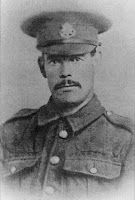James was the nephew of Ann Esther Ibbott Miles and it soon became apparent that he had led an interesting and varied life.
Born at the beginning of 1853 to James and Mary Miles in the small village of Tempsford, Bedfordshire, where so many of my ancestors hailed from, he was the youngest of nine children. His mother gave birth to him at the age of 48, nine years after her last child, so his arrival was probably a bit of a surprise to the family. His father worked the land, as James would have done around his schooling.
By the time he was 18, James was working as a footman at Longstowe Hall, near Cambridge. This grand Elizabethan pile was owned at the time by Sidney Stanley, local landowner and a Justice of the Peace for Cambridgeshire. This was a large and busy household as not only did Stanley and his wife have seven children but they were looked after by a huge staff ranging from the butler, governess and housekeeper at the top of the servant's ladder to a number of housemaids and laundry maids at the opposite end of the pecking order. It was all very 'Downton Abbey'!
 |
| Longstowe Hall (photo courtesy www.longstowehall.co.uk) |
 |
| The servants of Petworth House, Sussex in the 1870s. Just the type of uniform that James would have worn. (Photo via https://countryhousereader.wordpress.com/2013/12/19/the-servant-hierarchy/) |
Perhap life in this large privileged household didn't offer enough excitement and challenge for the young James Miles as in 1878, when he was 24 years old, James began a whole new chapter in his life; one which offered the prospect of adventure and travel. On the last day of January of that year, at 11am in the morning, James signed up for 12 years service in the infantry of the British army. He was to spend his army career in the 4th Battalion, the King's Own (Royal Lancaster) Regiment who had their home barracks in Lancaster.
 |
| The badge of the 4th Battalion, King's Own Regiment |
A posting in Jamaica was once considered a death sentence, and James was not to escape illness. Even though he was stationed in Newcastle high in the Blue Mountains where soldiers were less susceptible to yellow fever, James still succombed to 'neuralgia' and later whilst in Up Park camp in Kingston, he fell ill with a fever that hospitalised him for two weeks.
The only blemish on an otherwise impeccable army career was his demotion from sergeant to corporal as a result of drunkenness in August 1884 whilst stationed at Castletown on the Isle of Man. My reaction to that was 'Oh James, why, oh why, did you do that?'. But it didn't stop him in his tracks and he was soon back on the promotional ladder. His service record states he had a 'very good' character and would have received many good conduct badges if he hadn't been promoted.
At the end of his second term, and exactly 21 years to the day since he had signed up, he was discharged from the army. He was 45 years old.
 |
| Bowerham Barracks, Lancaster - where James spent his 21-year military career. (Photo: http://www.kingsownmuseum.plus.com/galleryaccommodation02.htm) |
In 1890 he had married Annie Gregory, a Yorkshire lass born in Sheffield who had worked at the County Asylum located a stone's throw from the Bowerham Barracks in Lancaster where James lived and worked. They had three children in the space of five years. So it was in 1899 that James and his young family left Lancaster and the army life he, and they, had known for so many years, and relocated to Longsight in Manchester. It was here that James embarked on a new career in a relatively new industry. He became a telephone operator.
James worked for the National Telephone Company [NTC]. The industry had only been in existence since the 1870s with the NTC itself being formed in 1881 and it's around about this time that the first telephone exchange opened in Manchester. Most telephone operators were women, so it strikes me as unusual to find James in this role. However, this is the job that he did from at least 1901 to 1911. A caller would connect to the exchange where a telephone operator such as James would connect them to the required destination. I'm really proud to think that an ancestor of mine worked in a fairly pioneering industry.
James died on 16th February 1915 at his home in Levenshulme, Manchester. He was relatively young as he was only 62.
I became intrigued by him when I discovered on one census that he'd been a telephone operator and on an earlier census he'd been a soldier. What a change in occupation! He was an ordinary chap, and he probably considered a lot of his day to day life to be pretty humdrum, but I think he has a fascinating career history - full of variety and innovation. He demonstrated his character through his army promotions and he looked the future in the face when taking on new fangled telephones in the first decade of the twentieth century. He started his life in a small agricultural village and ended it in a major metropolis working in an industry of the future. His life exemplified how life for everyone changed so rapidly in the 19th and 20th centuries.






